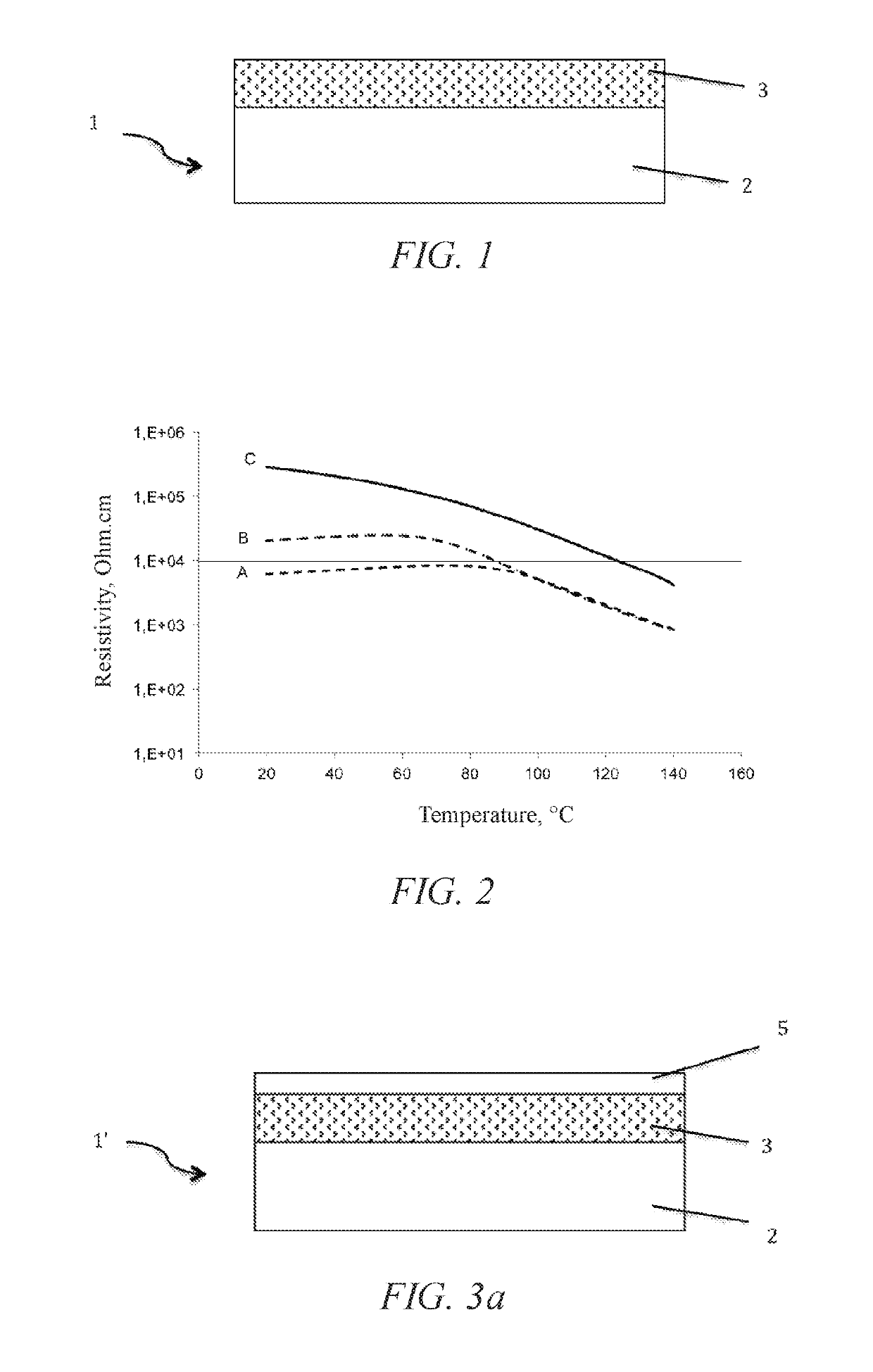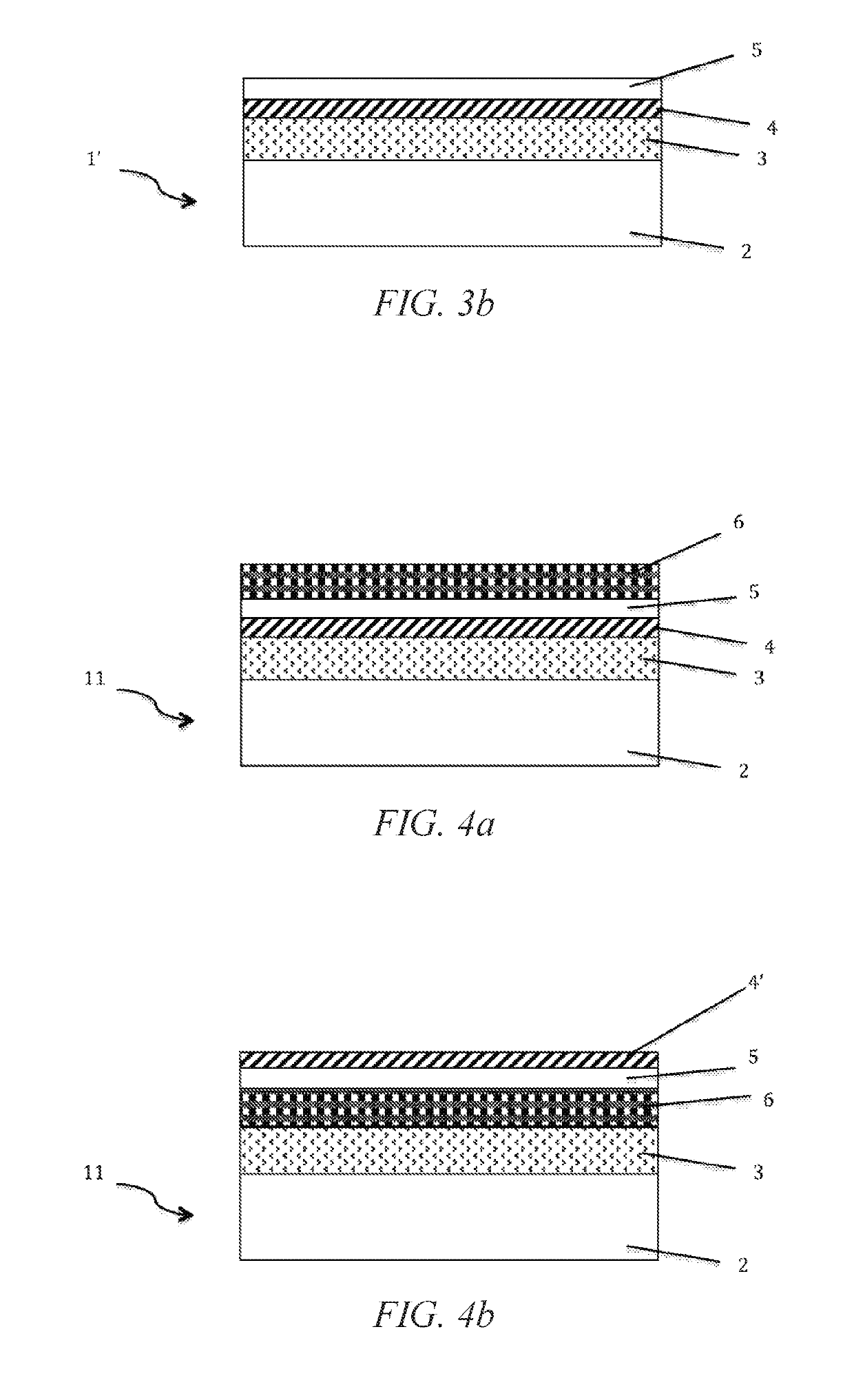Structure for radiofrequency applications
a radiofrequency and structure technology, applied in the direction of semiconductor devices, piezoelectric/electrostrictive/magnetostrictive devices, cell components, etc., can solve the problems of non-linear distortion of signals (harmonics), ever-increasing linkage between, and unnecessary consumption of a portion of signal energy, so as to achieve good stability and repeatability of rf performances
- Summary
- Abstract
- Description
- Claims
- Application Information
AI Technical Summary
Benefits of technology
Problems solved by technology
Method used
Image
Examples
first embodiment
[0065]According to the disclosure, the structure 1 for radiofrequency applications may adopt the form of a wafer with dimensions compatible with microelectronic processes, for example, of a diameter of 200 mm or 300 mm, comprising the supporting substrate 2 and the trapping layer 3. The latter may be produced according to the first or second example mentioned above, though these manufacturing examples are nevertheless not exhaustive.
second embodiment
[0066]According to the disclosure illustrated in FIG. 3a, the structure for radiofrequency applications may adopt the form of a wafer and furthermore comprise an active layer 5, arranged on the trapping layer 3, in and on which it will be possible to produce RF components. The active layer 5 may advantageously consist of semiconductive materials and / or piezoelectric materials. Advantageously, without being restrictive, however, the active layer 5 comprises at least one of the materials from among silicon, silicon carbide, silicon germanium, lithium nobiate, lithium tantalate, quartz and aluminum nitride. The thickness of the active layer 5 may vary between a few nanometers (10 nm, for example) and several tens of microns (50 μm, for example) according to the components to be manufactured.
[0067]By way of example, the active layer 5 is transferred to a supporting substrate 2 comprising the trapping layer 3, using one of the methods of transferring thin layers well known to the person ...
third embodiment
[0073] illustrated in FIG. 4a, the structure 11 for radiofrequency applications may also comprise or consist of a microelectronic device 6 on or in the active layer 5, wherein the latter is arranged on a dielectric layer 4 or directly on the trapping layer 3. The microelectronic device 6 may be a switching circuit, an adaptation or tuner circuit or even a power amplifier circuit, produced using silicon microelectronics technologies. The silicon active layer 5 typically has a thickness of between 50 nm and 180 nm, for example, 145 nm and the underlying dielectric layer 4 has a thickness of between 50 nm and 400 nm, for example, 200 nm; the trapping layer 3 is arranged between the dielectric layer 4 and the supporting substrate 2. The microelectronic device 6 produced in and on the active layer 5 comprises a plurality of active components (of the MOS, bipolar type, etc.) and a plurality of passive components (of the capacitance, inductance, resistor, resonator and filter type, etc.). ...
PUM
| Property | Measurement | Unit |
|---|---|---|
| temperature | aaaaa | aaaaa |
| electrical resistivity | aaaaa | aaaaa |
| resistivity | aaaaa | aaaaa |
Abstract
Description
Claims
Application Information
 Login to View More
Login to View More - R&D
- Intellectual Property
- Life Sciences
- Materials
- Tech Scout
- Unparalleled Data Quality
- Higher Quality Content
- 60% Fewer Hallucinations
Browse by: Latest US Patents, China's latest patents, Technical Efficacy Thesaurus, Application Domain, Technology Topic, Popular Technical Reports.
© 2025 PatSnap. All rights reserved.Legal|Privacy policy|Modern Slavery Act Transparency Statement|Sitemap|About US| Contact US: help@patsnap.com


